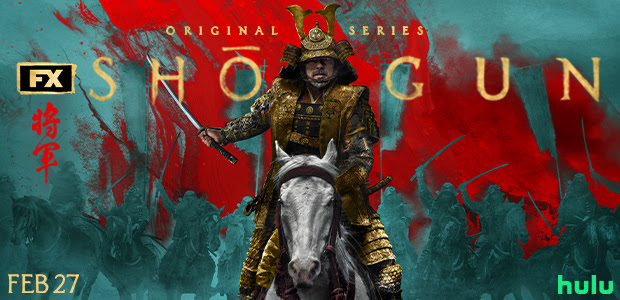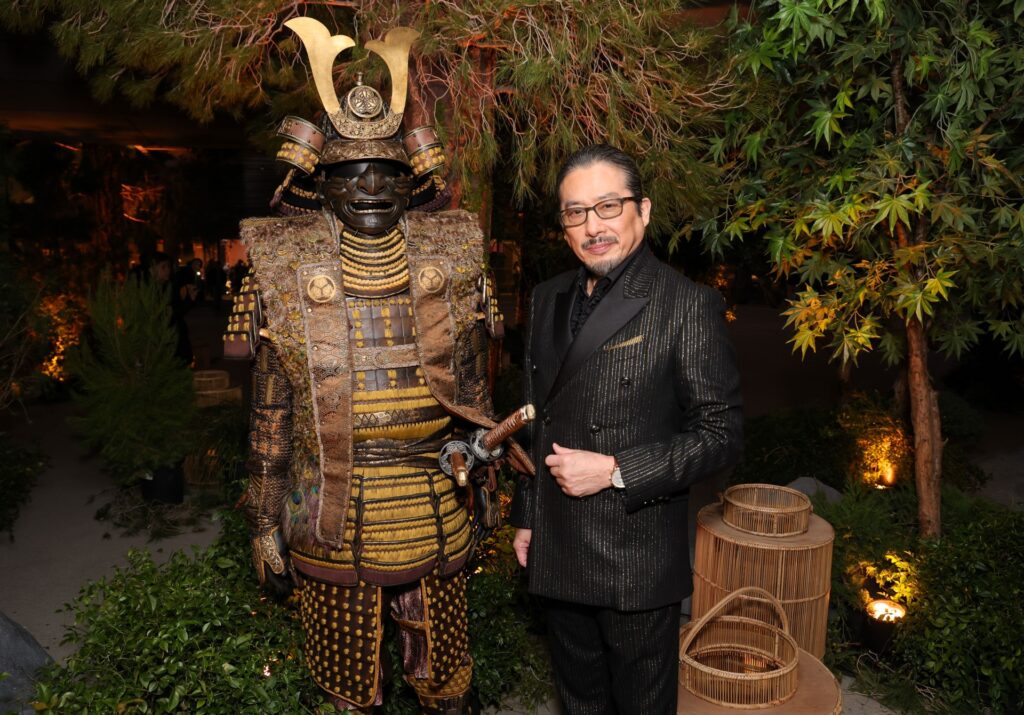By Kai Curry
NORTHWEST ASIAN WEEKLY
 FX’s limited series, “Shōgun,” is a pleasant surprise. Based closely on James Clavell’s best-selling novel, the story uses the arrival on Japan’s shore of Englishman John Blackthorne as a catalyst for presenting the politics of the time, including the fight for a new shōgun.
FX’s limited series, “Shōgun,” is a pleasant surprise. Based closely on James Clavell’s best-selling novel, the story uses the arrival on Japan’s shore of Englishman John Blackthorne as a catalyst for presenting the politics of the time, including the fight for a new shōgun.
“Shōgun” is probably Clavell’s best story and, if I dare to say it, his least discriminatory. Its sweeping introduction to the culture of Japan is mesmerizing. This new and updated version of the show is the culmination of thriving fandom. It’s beautifully filmed—ships floating out of the mist, Zen gardens representing world powerplay, incredible vistas of ancient Osaka and its formidable castle. Costumes are amazing—and as authentic as possible down to the ropes tying together the samurais’ shoes. Great acting and cast, bar none.
There are at least two main and memorable characters apart from Blackthorne, who is played in this version by Cosmo Jarvis. (Who is that? Good question! A British actor, musician, and filmmaker who manages Blackthorne’s wildly vacillating outrage and submission very well.) The person I never forgot from that original show back in the day was Lady (Toda) Mariko, also called Lady Maria by the Portuguese (ugh, so annoying how they rename things to suit themselves). Mariko is played this time by Anna Sawai, who is not only stunningly beautiful, but also captivating in her personality as she fights between her loyalty to her lord, her Christian faith, and, hmmm, might she also be fighting her interest in a certain pale-faced Englishman?

Anna Sawai and Cosmo Jarvis at the Los Angeles premiere. Photo Credit: Frank Micelotta/PictureGroup for FX.
The person who I will never forget from this version is Yoshii Toranaga, played by Hiroyuki Sanada, famous as “Scorpion” in “Mortal Kombat” and many other roles, now this one. I will admit I was falling asleep a little bit in episode one, called “Anjin ” or “Pilot”—as that’s what the Japanese call Blackthorne, who is a ship’s navigator. Blackthorne and his crew have come to Japan for somewhat ambiguous purposes but mainly to mess up the monopoly that the Portuguese had on trade there. This is around 1600, when the European powers-that-be were happily carving up the globe as if no one else lived on it. You remember. On top of politics and money (as if that wasn’t enough), there is also religion—at least three. First, the English Protestants and the Portuguese (and Spanish) Catholics hate each other. Then there is the native spirituality of the Japanese, some of whom have converted to Catholicism. If you’ve ever seen the movie “The Mission,” this version of “Shōgun” is very similar in mood and worldview.

At the Los Angeles premiere, Hiroyuki Sanada stands next to the armor his character wears in “Shōgun”. Photo Credit: Frank Micelotta/PictureGroup for FX.
I was falling asleep a little because episode one necessarily has to spend its hour getting us settled into this complicated story and introducing us to a large host of characters. The previous shōgun has died, and left a vulnerable young heir. Although Toranaga (based on real person, Tokugawa Ieyasu) is offered the shōgunate, he declines for the safety and security of the land, thinking that if everyone is left to intrigue about it (they are formed into a Council of Regents), then they will be less likely to just outright kill someone. He’s wrong, and Blackthorne walks right into this mess wherein both sides (Toranaga’s and that of his main rival, Ishido’s, played by Takehiro Hira) try to use him to gain leverage (it’s a strange angle but it makes sense by the end of episode two). That by the way is almost all the names I’m going to remember.
FX’s “Shōgun” manages to make all of this interesting. What I remember liking best when I read the book and watched the old series was mainly the cultural aspects and of course, the “romantic” interactions between Blackthorne and Mariko. I was particularly enamored of how she could get up and down from the floor without using her hands. Yeah, that’s where I was at. This time, though, the whole thing is entrancing. Once you break out of the confusion of getting your whereabouts inside the show, you become totally hypnotized. I did not notice time passing at all for over half of the second episode. I came out of a fog when suddenly it was over.
How to describe it? There is an incredibly effective use of eye contact. Maybe because for a great part of the start of the story, people can’t speak each other’s languages, so they are all staring raptly into each other’s faces trying to figure things out. As a result, so are you. You get caught up in the laser beam gazes passing between Toranaga/Sanada and Blackthorne/Jarvis, especially. Easy to say, that is now my favorite part of the show—the interaction of these two men as they get to know one another, not just as political players, but as people. Something about Sanada’s presence is so calming, even in the midst of the storm surrounding his character, that you don’t want him to leave the screen ever—or maybe that’s because I have a huge crush on him.
There’s some humor. I didn’t really find it that hilarious, but other people seem to. One of the main “themes” is the two clashing civilizations calling each other names. Each thinks the other is barbaric and savage. A reality check comes from a Spaniard (Néstor Carbonell) working for the Portuguese who responds to Blackthorne’s misconception of the superiority of Europe by saying, “Wait till you get ahold of Osaka and try to tell me that” (I’m paraphrasing). The Japanese think the Europeans are filthy (I agree—there is a scene where Blackthorne objects to more than one bath a week and that was a real thing). The Europeans think the Japanese are beneath them and only tolerate them in order to use them for their own gain, religious, political, or economical.
At the same time, a healthy respect quickly grows between the primary players (I’m not saying at large, but amongst the likable folks) for each other’s ways of life. Blackthorne is astounded to learn of the samurai code of honor (i.e., their willingness to commit seppuku, which a local priest interprets as being able to choose when you die); while Toranaga appreciates Blackthorne’s fiery spirit (and Lady Mariko appreciates his blue eyes, ahem). It’s a game wherein distrust abounds, full of delightfully sly hidden meanings, and then bursts of emotion. Toranaga is under siege by his rivals, yet just as you want him to do, he stays one step ahead. One of my favorite parts early in the series is when he intuits that one of his own men has staged a fake ambush, and turns to said traitor and comments, (again, paraphrasing), “best be on your guard, it’s dangerous out there, you know what I mean?” Hint, hint. Wink, wink. These small victories are so satisfying.
All in all, I was extremely satisfied at the quality of this retelling.
FX’s “Shōgun” airs Feb. 27 on Hulu.
Kai can be reached at info@nwasianweekly.com.



